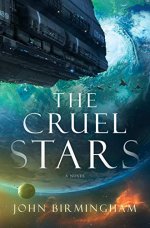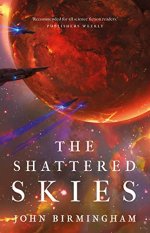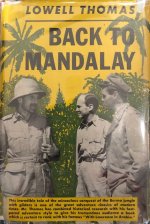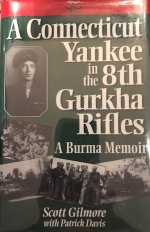theBaron
Major
- Joined
- Mar 27, 2008
- Messages
- 10,536
Mark, have you read Ibrahim's "The Sword and the Scimitar", too? A good history of the topic.
Prost!
Brad
Mark, have you read Ibrahim's "The Sword and the Scimitar", too? A good history of the topic.
Prost!
Brad

John Birmingham is a British born authour that now lives in Brisbane, Queensland...However I find his Sci Fi books entertaining...
Have you ever read David Drake's "Hammer's Slammers" stories, Matt? If you like military sci-fi, you might enjoy them. Also, if you haven't read "The Expanse" series of novels, I recommend them, too. They've been made into a TV series, which isn't bad, but the books are much better.
Prost!
Brad
I'm not really into Fantasy Sci Fi apart from 'The Lord of the Rings' that I read back in 1971 during my first year of High School. I really enjoyed the LOTR films, but actually Hate the recent Rings of Power, what a pile of Amazon B.S.
I haven't read any of Drake's books Brad, I checked my local library and the Hammer Slammer series is no longer available there. I'll see if I can get some of the Expanse books.
Another good mil sci fi author is Tim Pratt, his Axiom series being one of my favs.
I first became interested in Military Sci Fi way back in the early 1970's when I read a book called 'Light a Last Candle' by Vincent King. Not a famous Sci Fi author but I found it easier to 'digest' than more famous books such as 'Stranger in a Strange Land'.
I'm not really into Fantasy Sci Fi apart from 'The Lord of the Rings' that I read back in 1971 during my first year of High School. I really enjoyed the LOTR films, but actually Hate the recent Rings of Power, what a pile of Amazon B.S.
Jackson's movies started out promisingly, but quickly went south for me. He changed the stories too much. I saw all three "Lord of the Rings" films, and his first installment of "The Hobbit". That's what killed it for me. I almost walked out, but I thought, "Ten bucks is ten bucks", so I stuck it out. He took an enjoyable little story you can read in a day and turned it into a 7-hour-and-54 minute waste of time. Casting choices were good, and the production values were good, but the changes to the story ruined it for me.
But I'm biased. I'm a Tolkien fan from way back, too. My 6th grade homeroom teacher read (read!) us "The Hobbit" in installments each day before lunch, and then she started "The Fellowship of the Ring". I was hooked. Through Tolkien, I learned about studying languages, and eventually that influenced my major in college. So the movies are almost an insult. Jackson should have stuck with producing high-quality injection-molded kits of Great War airplanes in 1/32 scale.
Prost!
Brad
I guess I have got used to the changes over time mainly due to the fact that the LOTR and Hobbit films were at least Entertaining and 'mostly' followed Tolkiens stories and of course Peter Jackson was passionate about making the films. The same cannot be said for the Power of the Rings, I can see no passion, just an adoption of the franchise to make money without providing Any Entertainment while promoting over the top Wokeness.
I also got a different perspective from a former co-worker who is a fan of fantasy adventure movies, but doesn't read a lot. So all he knows is the movies. Seen from that perspective, I can understand why the movies and the next generation of streaming content sold and sell so well. I had to make a similar change in perspective regarding "The Patriot". When I first saw it, I judged it as if it were a documentary, or a historical drama, aspiring to accuracy. And I hated it. Then I happened to watch "Northwest Passage" again, and I realized that it was pure entertainment. And I made the same leap for "The Patriot". Inaccurate? Yes. A good adventure set against a historical background? Yes, too. I still won't watch any of the LOTR franchise, but I understand if other people enjoy it. I'll stick with reading the books.
In fact, it's about time to re-read "The Hobbit" and "The Lord of the Rings" again...
Prost!
Brad
Jackson's movies started out promisingly, but quickly went south for me. He changed the stories too much. I saw all three "Lord of the Rings" films, and his first installment of "The Hobbit". That's what killed it for me. I almost walked out, but I thought, "Ten bucks is ten bucks", so I stuck it out. He took an enjoyable little story you can read in a day and turned it into a 7-hour-and-54 minute waste of time. Casting choices were good, and the production values were good, but the changes to the story ruined it for me.
But I'm biased. I'm a Tolkien fan from way back, too. My 6th grade homeroom teacher read (read!) us "The Hobbit" in installments each day before lunch, and then she started "The Fellowship of the Ring". I was hooked. Through Tolkien, I learned about studying languages, and eventually that influenced my major in college. So the movies are almost an insult. Jackson should have stuck with producing high-quality injection-molded kits of Great War airplanes in 1/32 scale.
Prost!
Brad




